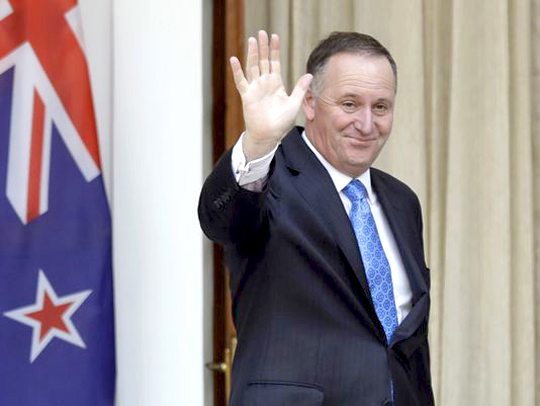Wellington, Dec 5: New Zealand's popular Prime Minister John Key stunned the nation on Monday when he announced, in a breaking voice, he was resigning after eight years as leader.

Key had been widely expected to contest his fourth general election next year. But he said he wanted to ensure he didn't make the mistake that some other world leaders have done, and instead wanted to leave while he was on top of his game.
Speaking in a shaking voice, Key said he had made personal sacrifices for the job and the role had taken a toll on his family.
Key said his National Party caucus would meet Dec. 12 to decide on a new party leader and prime minister, and that he expected to formally submit his resignation to the Governor-General that same day.
He said he would back his deputy Bill English to take over. English said he would likely decide in the next day or two if he would seek the role.
The New Zealand dollar fell by nearly 1 percent on the news and was trading at $0.71 U.S.
Australian Prime Minister Malcolm Turnbull said he'd sent Key a short message: ``Say it ain't so, bro.''
``John Key is one of the most outstanding national leaders in the world today,'' Turnbull told reporters. ``He has done an extraordinary job for New Zealand. He is somebody that all of us, right around the world, leaders in countries large and small, draw inspiration from.''
New Zealand's opposition leader Andrew Little said the decision had taken everybody by surprise.
``He is entitled to be recognized for what he has done for New Zealand,'' Little said. ``He's been there through some pretty difficult times.''
Key was a successful currency trader before turning to politics. He was elected to the nation's parliament in 2002 and enjoyed a quick rise, becoming leader of his center-right opposition party in 2006. He won his first general election and became prime minister in 2008.
He won subsequent elections in 2011 and 2014 and retained unusually high popularity ratings. His party was a clear favorite to win the most votes at next year's election, at least until his announcement on Monday.
Key said that steering the country of 4.7 million through the economic crisis of 2008 and on to improved fortunes was a proud accomplishment.
``Very few countries are in the financial position we are in,'' Key said. ``We're strong, we're in surplus, we're growing, we're creating jobs, we're doing well.''
New Zealand is enjoying relatively robust annual GDP growth of over 3 percent and the unemployment rate has fallen below 5 percent, thanks in part to growth in tourism and construction.
Key also talked about the importance of standing beside the people of Christchurch after an earthquake in 2011 killed 185 people.
``Simply put, it has, for me, been the most remarkable, satisfying and exciting time of my life,'' he said. ``But despite the amazing career I have had in politics, I have never seen myself as a career politician.''
He said the role came with costs.
``For my wife Bronagh, there have been many nights and weekends spent alone,'' he said. ``My daughter Stephie and my son Max have transitioned from teenagers to young adults while coping with an extraordinary level of intrusion and pressure because of their father's job.''
He said he wasn't sure what life after politics would bring, other than he would probably take up positions on a couple of company boards and accept international speaking engagements. He said he would remain on as a member of parliament long enough that he wouldn't force a special election ahead of next year's general election.
``All I can say is that I gave it everything I had,'' he said. ``I left nothing in the tank.''





Comments
Add new comment